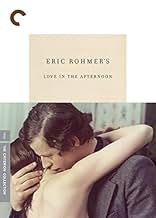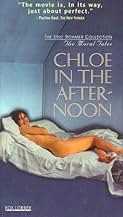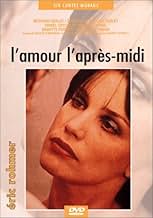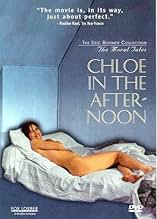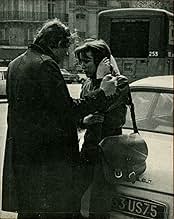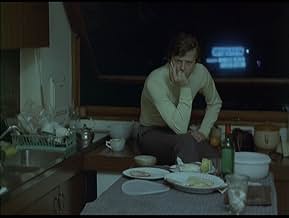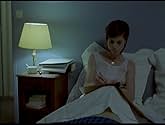Aunque tiene una esposa que lo adora, un hombre burgués todavía está tentado de seducir a otras mujeres.Aunque tiene una esposa que lo adora, un hombre burgués todavía está tentado de seducir a otras mujeres.Aunque tiene una esposa que lo adora, un hombre burgués todavía está tentado de seducir a otras mujeres.
- Dirección
- Guionista
- Elenco
- Premios
- 1 premio ganado en total
- Martine
- (as Babette Ferrier)
- Dirección
- Guionista
- Todo el elenco y el equipo
- Producción, taquilla y más en IMDbPro
Opiniones destacadas
The title, while good, is misleading, as is the sexy cover on this video. (The French title, L'amour l'apres-midi, is better; but that title in English was taken by Love in the Afternoon (1957) starring Gary Cooper and Audrey Hepburn.) This is about as sexy as a Disney movie (although there is some backside nudity), yet it is an intriguing story about love, human sexuality and the question of monogamy. I can already see some of the other reviews: "Too talky." "Endless talk and no action." Ah, but they are wrong. This is a fascinating film in which the action is subtle and true and very interesting.
Francoise Verley plays Frederic's wife. She is not nearly as pretty as he thinks she is. Nor is she as removed from his life away from her as he naively believes. Eric Rohmer's subtle direction makes it clear that she knows more than she will ever tell him, that she loves him and perhaps prays that he still loves her. But she is above saying a single word. One gets the sense that she knows he is a man so attractive to other women that it is inevitable that he will stray. But does he? The final scene in which we know why she is crying--although ironically, he does not--is just beautifully done and ends the movie at exactly the right moment.
Zouzou plays Chloe who is Parisian, bohemian and quietly desperate. As usual with Rohmer there is a kind of realism in the movie that defies description. The people and the scenes and the events are real; there is no straining for effect, and everything is understated with a characteristic Rohmerian message about human nature.
This starts slow and never really speeds up, but do yourself a favor and stay with it. The denouement is beautifully turned and the revelation of the three principal characters is as clear and clean and agreeable as Chloe after her shower.
(Note: Over 500 of my movie reviews are now available in my book "Cut to the Chaise Lounge or I Can't Believe I Swallowed the Remote!" Get it at Amazon!)
When Chloe (Zouzou), a free-spirited friend he used to know shows up, Frederic finds a release in her companionship and is able to confide in her in a way that he is unable to do with his wife. They spend afternoons together talking about love and relationships. She confesses that she doesn't want to be married but would like to have a child, particularly one with Frederic. The central tension of the film is the choice Frederic must make between his passion for Chloe and his love for his wife. Although he is tempted to have an affair with Chloe, he spends too much time pondering the pros and cons and doesn't act. Chloe on the other hand is in love with Frederic and has a come-what-may attitude toward his entanglements.
Like Jerome (Claire's Knee) and Jean-Louis (My Night at Maud's), Frederic is weak and indecisive and is forever attempting to justify his inability to choose. He stands on the edge of temptation but is never quite ready to jump. Rohmer does not, however, make any moral judgments but hints that Frederic's temptation and pangs of conscience are something most of us go through at some time in our lives.
Though there is a lot of talking in Chloe in the Afternoon, it never seems false or tiresome. This is a very charming film that Pauline Kael called "in every respects, a perfect film". It has a natural rhythm with characters that are so real that you don't want to leave them when the film ends. As Frederic's ultimate choice looms, we are privy to some sharp and insightful dialogue that illuminates the complexity of relationships. The story is told from the husband's point of view and we are left wondering how different it would be if told by his wife. Her tears at the end provide a clue.
¿Sabías que…?
- TriviaThis film is part of the Criterion Collection, spine #348.
- ErroresAt approximately 1:16 in the film, Chloe opens the store door wearing red shoes matching her dress. In the following scene, she walks down a staircase wearing black shoes which match her stockings.
- Citas
Frédéric: [voice over] That's why I love the city. People come into view, then vanish. You don't see them grow old. What makes the streets of Paris so fascinating is the constant yet fleeting presence of women whom I'm almost certain never to see again. It's enough that they're there, indifferent, conscious of their charm, happy to test its affect on me, as I test mine on them, by tacit agreement, without even the subtlest smile or glance. I feel their seductive power without giving in to it. This doesn't estrange me from Hélène. Far from it. I tell myself these passing beauties are simply an extension of my wife's beauty. They enrich her beauty and receive some of hers in return. She's the guarantee of the world's beauty and vice versa. When I embrace Hélène, I embrace all women.
- ConexionesFollows La boulangère de Monceau (1963)
Selecciones populares
- How long is Love in the Afternoon?Con tecnología de Alexa
Detalles
Taquilla
- Total a nivel mundial
- USD 3,520
- Tiempo de ejecución1 hora 37 minutos
- Mezcla de sonido
- Relación de aspecto
- 1.37 : 1
Contribuir a esta página


![Ver Bande-annonce [OV]](https://m.media-amazon.com/images/M/MV5BNDVkYjA1MTItYWFjMi00ZTQ3LTg2NGQtZmZhOTg4MjU1MTg4XkEyXkFqcGdeQXRyYW5zY29kZS13b3JrZmxvdw@@._V1_QL75_UY281_CR5)
